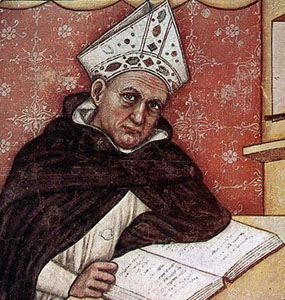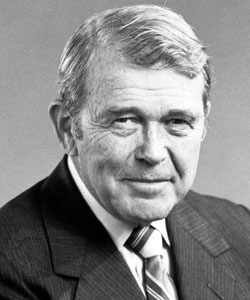
Albertus Magnus, O.P., also known as Saint Albert the Great and Albert of Cologne, was a German Catholic Dominican friar and bishop. Later canonised as a Catholic saint, he was known during his lifetime as Doctor universalis and Doctor expertus and, late in his life, the sobriquet Magnus was appended to his name. Scholars such as James A. Weisheipl and Joachim R. Söder have referred to him as the greatest German philosopher and theologian of the Middle Ages. The Catholic Church distinguishes him as one of the 36 Doctors of the Church.

William Redington Hewlett was an American engineer and the co-founder, with David Packard, of the Hewlett-Packard Company (HP).

David Packard was an American electrical engineer and co-founder, with William Hewlett, of Hewlett-Packard (1939), serving as president (1947–64), CEO (1964–68), and Chairman of the Board of HP. He served as U.S. Deputy Secretary of Defense from 1969 to 1971 during the Nixon administration. Packard served as President of the Uniformed Services University of the Health Sciences (USU) from 1976 to 1981. He was also chairman of the Board of Regents from 1973 to 1982. Packard was the recipient of the Presidential Medal of Freedom in 1988 and is noted for many technological innovations and philanthropic endeavors.

The Graduate Theological Union (GTU) is a consortium of eight private independent American theological schools and eleven centers and affiliates. Seven of the theological schools are located in Berkeley, California. The GTU was founded in 1962 and their students can take courses at the University of California, Berkeley. Additionally, some of the GTU consortial schools are part of other California universities such as Santa Clara University and California Lutheran University. Most of the GTU consortial schools are located in Berkeley area with the majority north of the campus in a neighborhood known as "Holy Hill" due to the cluster of GTU seminaries and centers located there.
The term "exotheology" was coined in the 1960s or early 1970s for the examination of theological issues as they pertain to extraterrestrial intelligence. It is primarily concerned with either conjecture about possible theological beliefs that extraterrestrials might have, or how our own theologies have been or will be influenced by evidence of and/or interaction with extraterrestrials.

Trinity Evangelical Divinity School (TEDS) is an academic divinity school founded in 1897 and located north of Chicago, Illinois. TEDS is one of the largest seminaries in the world, enrolling more than 1,200 graduate students in professional and academic programs, including more than 150 in its PhD programs. The most popular degree at the school prepares pastors, educators, and missionaries for many kinds of service. The school also offers a range of more focused Master of Arts programs in counseling ministries, Christian thought, New Testament, Old Testament, and other disciplines.

Edward Cornelis Florentius Alfonsus Schillebeeckx was a Belgian Roman Catholic theologian born in Antwerp. He taught at the Catholic University in Nijmegen.

Marie-Dominique Chenu was a progressive Roman Catholic theologian and one of the founders of the reformist journal Concilium.
Theodore Frank Peters, known as Ted Peters, is an American Lutheran theologian and Professor of Systematic Theology at Pacific Lutheran Theological Seminary. In addition to his work as a theologian and educator, he is a prolific author and editor on Christian and Lutheran theology in the modern world. He is also the editor of Dialog, a quarterly scholarly magazine of modern and postmodern theology, and co-editor of Theology and Science. Peters also serves on the Advisory Council of METI. He received a BA from Michigan State University, an MDiv from Trinity Lutheran Seminary, and an MA and PhD from the University of Chicago.
Michael Welker is a German Protestant theologian and professor of Systematic theology (Dogmatics).
Fergus Gordon Thomson Kerr is a Scottish Roman Catholic priest of the English Dominican province. He has published significantly on a wide range of subjects, but is famous particularly for his work on Ludwig Wittgenstein and Thomas Aquinas.
Robert John Russell is founder and Director of the Center for Theology and the Natural Sciences (CTNS). He is also the Ian G. Barbour Professor of Theology and Science in Residence at the Graduate Theological Union (GTU). He has written and edited a great deal on possible scientific mechanisms for the beliefs of Christianity.

Giuseppe Pecci was a Jesuit Thomist theologian whose younger brother, Vincenzo, became Pope Leo XIII and appointed him a cardinal. The Neo-Thomist revival, which Leo XIII and his brother Giuseppe, Cardinal Pecci originated in 1879, remained the leading papal philosophy until Vatican II.

The Flora Lamson Hewlett Library is the central library of the Graduate Theological Union. Located on the summit of the "Holy Hill" area of Berkeley, its collections comprise one of the largest collections of theological works in the United States, with over 500,000 volumes as of 2014. The library's collections are open to the public. Borrower privileges are accessible not only to students and faculty of the GTU's consortial seminaries and affiliated centers, but also to the faculty and students of the University of California, Berkeley, Stanford University, and American Theological Library Association institutions participating in Reciprocal Borrowing. The Hewlett Library also maintains a branch on the campus of San Francisco Theological Seminary at San Anselmo. It also has storage facilities on the campus of the American Baptist Seminary of the West and at Santa Clara University.
The Thomasian Martyrs were the Dominican Catholic priests who became administrators, professors, or students in the University of Santo Tomas, Manila. All of them gave up their lives for their Christian faith, some in Japan, others in Vietnam, and in the 20th century, in Spain during the Spanish Civil War. St. Lorenzo Ruiz de Manila was among the lay companions of the Thomasian martyrs of Japan.

Inge Johan Lønning was a Norwegian Lutheran theologian and politician for the Conservative Party of Norway. As an academic, he was Professor of Theology and Rector of the University of Oslo during the term 1985–1992. As a politician, he served as President of the European Movement in Norway, as a Member of Parliament, as Vice President of the Parliament, as Vice President of the Conservative Party, and as President of the Nordic Council.
Jerome Murphy-O'Connor, O.P. was a Dominican priest, a leading authority on St. Paul and Professor of New Testament at the École Biblique in Jerusalem, a position that he held from 1967 until his death.
Benedict M. Ashley, O.P., was an American theologian and philosopher who had a major influence on 20th century Catholic theology and ethics in America through his writing, teaching, and consulting with the United States Conference of Catholic Bishops. Author of 19 books, Ashley was a major exponent of the River Forest Thomism. Health Care Ethics, which he co-authored in 1975 and now in its fifth edition, continues to be a fundamental text in the field of Catholic Medical Ethics. Ashley taught at numerous institutions and was an active teacher, consultant, and author. He was a faculty member of the Institute for Advanced Physics, a physics research and educational organization reintegrating the foundational principles given directly through our senses into the heart of modern science, from 2003 till his death. He called the Institute for Advanced Physics "the first and only institution addressing this problem [the disintegration of secular and religious culture] at its core by integrating the proper philosophical depth into the heart of modern science."
Edward N. Peters, JD, JCD, Ref. Sig. Ap. (1957) is an American canonist and Referendary of the Apostolic Signatura. He is professor of canon law at the Sacred Heart Major Seminary of the Archdiocese of Detroit.

METI International, simply known as METI, is the non-profit research and educational organization that creates and transmits interstellar messages to extraterrestrial intelligence. In July 2015, the papers to form METI were filed by its founder and president, Douglas Vakoch. METI is headquartered in San Francisco, California.













